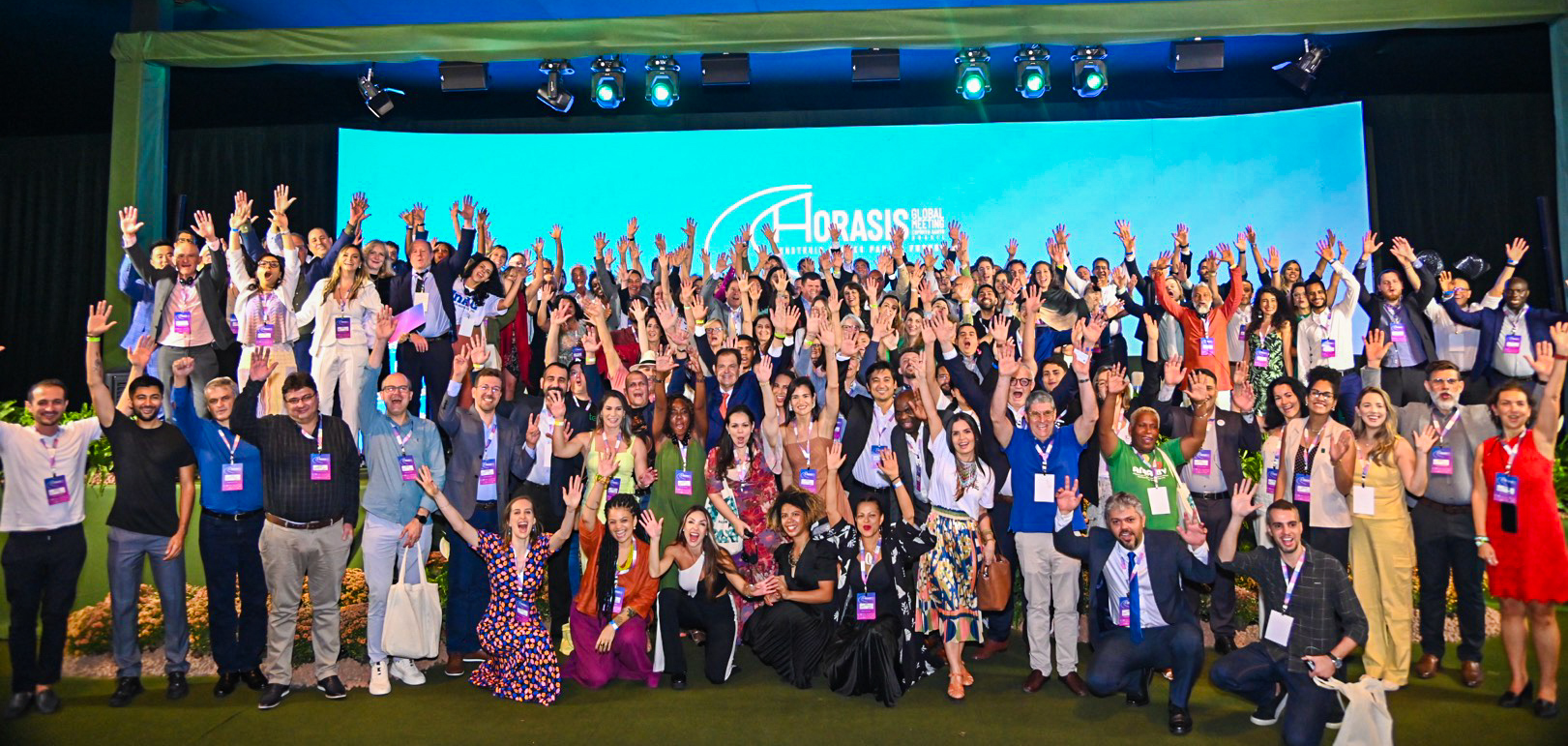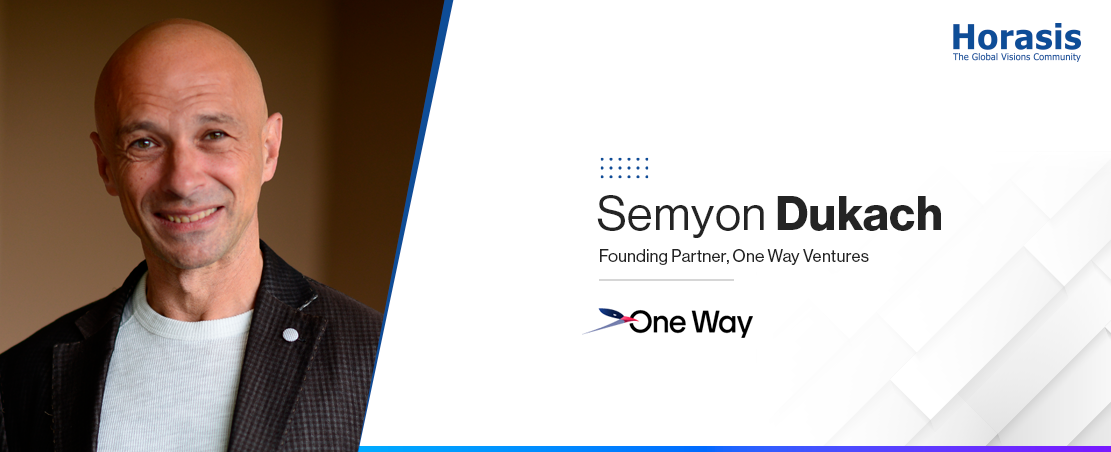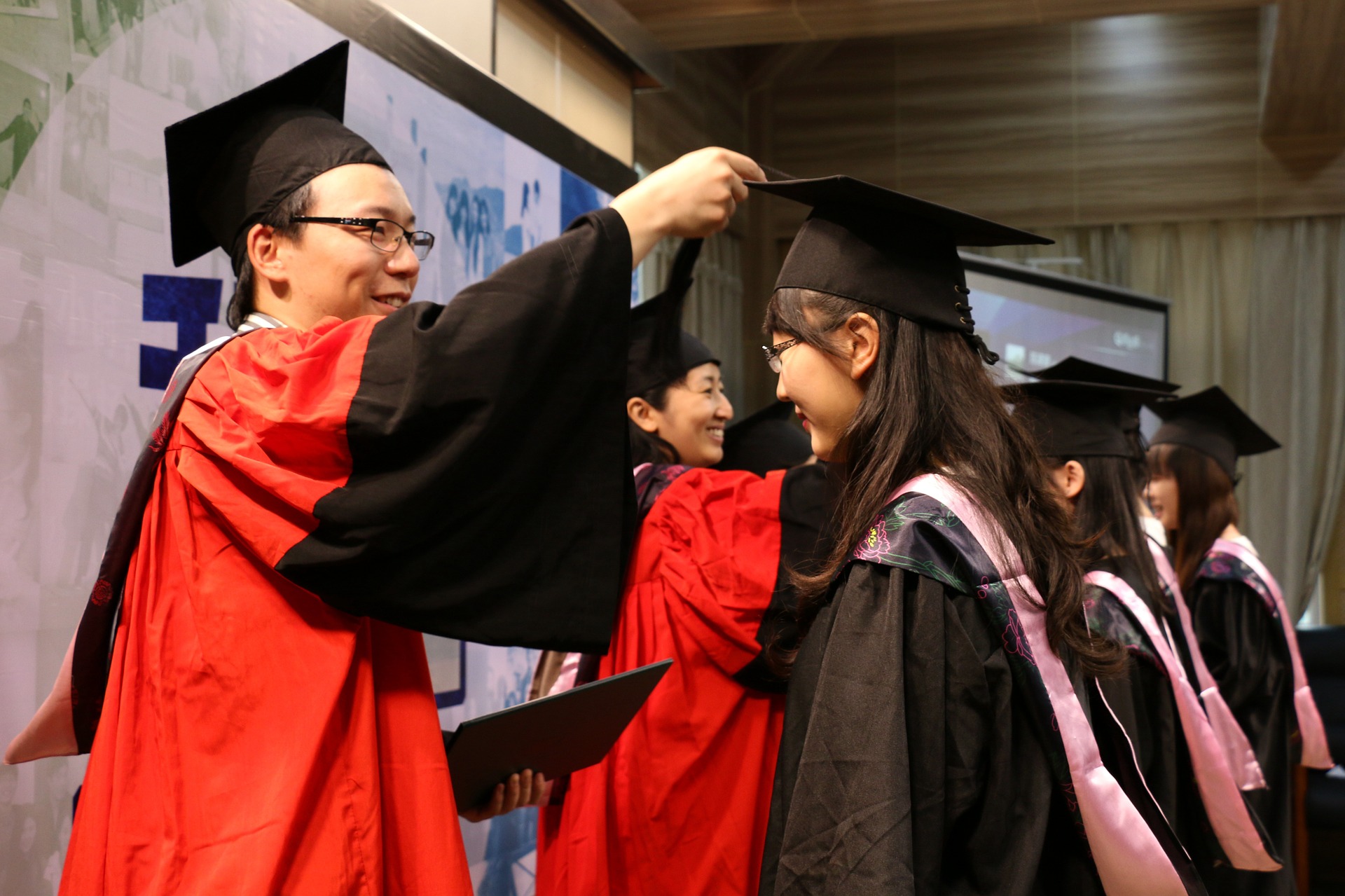Building Bridges to the Future: Report of the Horasis Global Meeting, Vitoria, Brazil, 24-27 October
The ninth Horasis Global Meeting took place in Vitória, Espírito Santo, Brazil. The Horasis Global Meeting has become a leading global forum for business leaders and entrepreneurs in a discussion platform where leaders can bridge divides in a world out of balance and ultimately to tackle the most pressing challenges facing societies today and tomorrow, including climate change, inequality and peace. This meeting was focused on Building Bridges to the Future. The meeting drew some 450 delegates from around the globe, including some of the leading global CEOs, well-known entrepreneurs and thought leaders, as well as Ministers and representatives of civil organizations to the city of Vitória in the State of Espírito Santo situated in the north east of Brazil.
Renato Casagrande, Governor, State of Espírito Santo, Brazil, Nailson Dalla Bernadina, President, Espírito Santo em Ação, Brazil; Paulo Baraona, President, Findes, Brazil and Renan Chieppe, President, Fetransportes welcomed Horasis participants to Espírito Santo. “Innovation and sustainability are at the heart of our economy. And Espírito Santo strengthens its ecosystem with a focus on impact-driven businesses. We invite you to invest in Espírito Santo – your investments will generate sustained economic growth and prosperity, and create jobs and business opportunities for our people.” they said.

Renato Casagrande, Governor, State of Espírito Santo, Brazil
The Horasis Plenaries led off with a discussion of the World’s Economic Outlook chaired by Eizen Wanderley, Undersecretary for Sustainability, State of Espírito Santo, Brazil. She noted she was responsible for developing and implementing policies and programs that foster social and environmental responsibility, innovation, and inclusion in the public and private sectors and earlier had developed an online platform that provided entrepreneurship education to 5,000 small businesses in Brazil, raising $30,000 for street vendors. Yves Leterme, Former Prime Minister of Belgium, Belgium stressed that innovative solutions will be required to ensure that new constitutions can form a genuine basis for sustainable peace and security, as well as for long-term democratic progress. While Claude Béglé, Chairman, SymbioSwiss, Switzerland said we need to focus on sustainability and tackling key environmental initiatives. Maria Cristina Frias, Partner, Grupo Folha, Brazil added that Brazil’s economy is in good shape, driven by tight labor markets and investments whilst Jose Amarildo Casagrande, Chief Executive Officer, Banestes, Brazil and Fernando Cinelli, Chief Executive Officer, Apex Partners, Brazil argued that risks like the fiscal deficit and restrictive monetary policy remain.
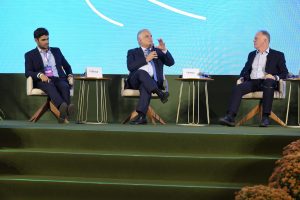
Márcio França, Minister of Entrepreneurship, Microenterprise and Small Business, Government of Brazil, making a point on a panel
This was followed by a plenary Modeling an ESG-friendly Capitalism chaired by Priyam Gandhi-Mody, Author and Founder, Vishwamitra Research Foundation, India. In this panel, Edison Carlos, Chief Executive Officer, Instituto AEGEA, Brazil stressed that we need a cultural change supporting environmental education, and a greater awareness of public policies enabling the engagement of the entire society. In simple terms, every piece of waste that doesn’t reach the environment is a step towards a more sustainable water supply chain and a healthier environment. And Luana Romero, Chief Executive Officer, Instituto Ideias, Brazil, said she believed that women should not wait for others to give them their rights, but to find the courage to speak up for themselves “We need to encourage girls and young women to pursue science and stay in science careers. We need stronger local, national and international policies that can help them follow those paths.” Edmar Camata, Secretary of Control and Transparency, State of Espírito Santo, Brazil affirmed that “putting people first, supporting entrepreneurial attitudes, innovation, and creativity are some of the concepts” must always be encouraged.
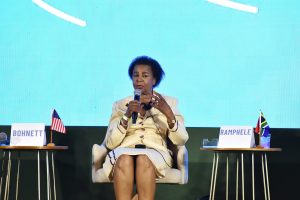
Mamphela Ramphele, Honorary President, Club of Rome, South Africa
In the plenary panel Establishing Bridges Towards Global Peace, Bjørn Berge, Deputy Secretary General, Council of Europe, France said “Democracy is not perfect, it’s a process, a commitment based on values and fundamental principles we all agree to”. His priorities look to advance democracy, human rights and the rule of law. He also oversees the Council of Europe’s staff policy, as well as other key areas of the work of that Organization. The plenary discussions were chaired by Kyle Bozentko, Executive Director, Center for New Democratic Processes, USA. Kyle Bozentko has overseen, contributed to, and executed deliberative engagement projects on issues in many countries, and also improving trust in and effectiveness of media. He brought together ideas from the US, Africa and Europe that reflected our difficult processes within democracies. Hichem Mechichi, former Prime Minister of Tunisia suggested former ministers ought not to be disruptive elements. He said he cannot be a disruptive element, and he will hand the responsibility to whomever the president chooses, in a step that may ease the North African country’s tough political crisis. “In order to preserve the safety of all Tunisians, I declare that I align myself, as I have always, by the side of our people, and declare that I will not take up any position or responsibility in the state.” And Rosalía Arteaga Serrano, Former President of the Republic of Ecuador noted how gender politics can play a deleterious part in the democratic process. She claimed that it was because of her gender that she was not allowed, as was her right, to stay as president after the February 97’ political crisis. “What happened to me was machismo.” Arteaga’s comments refer to the gender-based discrimination she experienced throughout her political journey – she was the first female politician to hold the Presidency in Ecuadorian history, and now dedicates much of her time to educational initiatives.
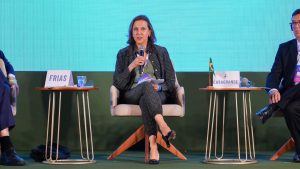
Maria Cristina Frias, Partner, Grupo Folha, Brazil, one of the summit co-chairs
The next plenary looked to nations often unheard: Bridging Towards the Global South the chair was Rúbya Salomão Amador, Executive Secretary, Espírito Santo Forum on Petroleum, Gas and Energy. She engaged with her panel members, the first of which was Bo Inge Andersson, Chief Executive Officer, Uzauto Motors, Uzbekistan. Uzauto Motors has over 13,000 employees and produces Chevrolet vehicles under a technical license agreement with GM. Two of his beliefs are that “one must measure business performance to understand how to reach future targets. And be very well aware of the human side of business as employees are the source of a firm’s wellbeing”. Fahim Hashimi, Chairman, Hashimi Group; Former Minister of Communications and Information Technology, Afghanistan emphasized that: “Good quality and low-priced internet is the right of every citizen and our main goal is to provide better environment and to promote the private sector with good service delivery.” Service and quality are guiding principles as he attempts to build one of the largest logistics companies in Afghanistan supporting critical services and resources to the government and international forces. Pablo Lira, President, Instituto Jones dos Santos Neves, Brazil understood how vital it is to ‘get everyone aligned to good policies’ – as reflected in the growth and success of Espírito Santo. The plenary was rounded off by Shamsuddeen Usman, Chairman, Ministry of Finance Incorporated and former Minister of Finance and National Planning, Nigeria. Usman said some policies are formulated with a lack of commitment to implement or a lack of continuity, and some arise from vested interests. He reflected on his work – “I looked very deeply at a number of issues, some of the things that I tried to do as minister, or as a deputy governor at the central bank and asked how successful have these been? Where have they not been successful and what are the reasons why we’ve not been successful?” he asked. “Hopefully these reflections should be a learning point for both people who are on the job currently as well as people who are coming behind.”
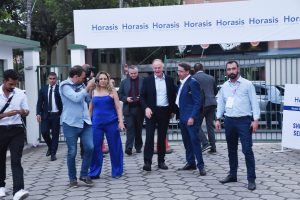
Governor Casagrande arrives at the conference site
The plenary ES 500 years – Transforming Espírito Santo into an ESG-led State was strongly anticipated as it was addressed by Renato Casagrande, Governor, State of Espirito Santo, Brazil who stated the State’s plans is to modernize its justice system through the implementation of the Moderniza/ES programme (supported by the Inter-American Development Bank (IDB) ) which aims to improve infrastructure, methodologies, and technology solutions to support the reintegration of released inmates. Compared to Brazil, Espirito Santo is a small state. “We have only 0.54% of the national territory. We also have a small population, approximately 3,550,000 inhabitants and an area of 46,000 km2. Yet it’s the country’s most globalized state, with almost 50% of the state’s GDP depending on international trade. We are diversified, our economy isn’t held up by one sole activity and we have formed a technological base of expertise in different regions of Espirito Santo,“ he said. The major challenge, as in all federalized nations, is the interface between federal and state authorizations. But the governor emphasized that Brazil is a great reference for energy transition. “We will have fundamental debates such as the economy, climate change, ESG practices and the future of our planet.” This Horasis meeting is an important international event for Latin America, for Brazil and for Espírito Santo,” he added. Márcio França, Minister of Entrepreneurship, Microenterprise and Small Business, Government of Brazil, emphasized that Brazil ranks among the most entrepreneurial nations globally, noting that the proportion of Brazilians engaged in starting and managing both established and new businesses has surged to over 40% of the adult population. Brazil also boasts a notable presence in the global startup ecosystem, housing eight unicorn companies—privately held ventures with valuations exceeding 1 billion US dollars. Overall, the Minister expressed optimism about the economy, noting that inflation had come down, trade was robust and the fiscal position improving. The plenary was chaired by Paul Clements-Hunt, Founder, The Blended Capital Group, United Kingdom who changed the way global investment thinks and acts. In 2004, while at the United Nations, he coined ESG. Thus, he opined “Espirito Santo stands out as a dynamic and well-governed state. Its vision is combined with a strong business community committed to sustainability which has attracted large investors.”
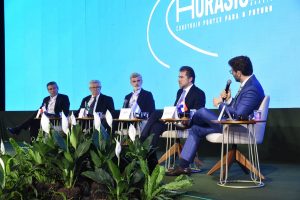
Plenary – Fostering South American Unity
The following plenary was titled Embedding ESG Throughout the Value Chain and chaired by Nisaa Jetha, Founder, Impact for SDGs, United Kingdom who is a leading Global Impact Strategist, one of the first coining the term. Thus, through a strategic and holistic approach she emphasizes the need for economic incentives and safeguards; and notes the pivotal role of responsible governance for sustainable transformation. Jose Amarildo Casagrande, Chief Executive Officer, Banestes, Brazil mentioned the need to embed ESG in all parts of business – to create an ESG-driven DNA. Banestes was founded over 86 years ago with a focus on rural credit, it is thus at the front end of local supply chains. This bank’s operations were well-placed to open specific credit lines with zero interest for the victims the flooding and heavy rains earlier in the year in the southern region of Mimoso. William Bohnett, Vice Chairman, American Forests, USA further emphasized the role of local support as he has acted for several climate-focused organizations including American Forests, the nation’s oldest conversationist group. Mamphela Ramphele, Honorary President, Club of Rome, South Africa stressed that “ESG is not divisible; we must be engaged in the strive for ESG-driven growth on every front.“ Mamphela Ramphele has had a celebrated career as an activist, medical doctor, academic, businesswoman, global public servant and political thinker. She is the Honorary President of global humanitarian non-profit Club of Rome, and is the former Managing Director of the World Bank. Her sentiments stem from her work in South Africa, but is equally at place in the rural situation of Espírito Santo as addressed by the bank Banestes. Charles Tang, Chairman, Brazil-China Chamber of Commerce & Industry, Brazil rounded off this discussion by broadening a viewpoint to include China. As early as 2017 he noted – “We have received many contacts from various Chinese companies; they want to operate in Brazil and I’m sure many of them will be here soon.” Felipe Rigoni, Secretary of State for Environment and Water Resources, State of Espírito Santo, Brazil concluded by saying that ESG can help businesses make sound decisions, and investors achieve better long-term returns.
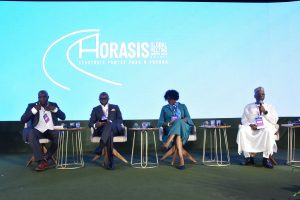
Plenary ‘Creating Multiple Bridges Across Africa’
The plenary No Water, No Business seems slightly ironic, given the massive floods a few months ago in Espírito Santo, but no one can control the weather. A point ably noted by Veronica Sánchez da Cruz Rios, President, Brazilian National Water and Sanitation Agency, Brazil. Stating the National Water Agency (ANA) is legally liable for implementing the National Water Resources Management System (SINGREH) and it was created to ensure the sustainable use of our rivers and lakes for the current and future generations. Importantly, it is to assure that the water bodies are used with parsimony, in addition to making possible the generation of the necessary financial resources to recover and conserve rivers and lakes. And sanitation was stressed by Munir Abud de Oliveira, Chief Executive Officer, CESAN, Brazil who promotes the management and monitoring to achieve the goals of universalizing sanitation services. Which was echoed strongly by Luana Pretto, Chief Executive Officer, Instituto Trata Brasil, Brazil who statesd “We can make a difference and boost basic services in Brazil by always defending what is most important to the population as a whole: the quality of life, health and the environment of the country.” These arguments were brought together by the chair, Alice Bouman-Dentener, Co-founder, Cansu Global, The Netherlands. She noted the 2030 Agenda for sustainable development which emphasized “all-of-society engagement and partnership” and “no one left behind”. She said she had witnessed women’s organizations working under very difficult conditions with very little funding that have made a big difference in their communities. Those voices are not heard at the global level and policies and programmes about them are made without them. She says it is high time to make actions bottom-up and top-down meet – first and foremost by creating awareness at the global level where states and international organizations can agree on a common development agenda.
Bridging Divides, Nurturing Cooperation was the plenary theme chaired by Mariana Luz, Chief Executive Officer, Maria Cecilia Souto Vidigal Foundation, Brazil. She reminded us there are just a few years remaining to achieve the SDGs. But the gap between rich and poor is widening, with the first increase in extreme poverty and inequality in more than two decades recorded in 2022. Very often, it is children who bear the brunt of inequality, with enduringly high numbers living in extreme poverty. She was pleased that Brazil, as a leading emerging economy and the current president of the G20, is among those at the forefront of the required radical change of direction. Furthermore, Michael Brown, US Senator, District of Columbia, USA reflected on the freedom to profess any religion, as well as a set of inalienable rights and equality. ”The power of a just government flows from the people,” he said. Murat Seitnepesov, President, Greater Caspian Association, Switzerland had noticed the lack of the principle of ‘doing the right things,’ across the Greater Caspian Region (GCR). The situation is getting better as his Swiss-based non-profit aims to promote and connect the GCR to the World. The Rapporteur on this panel, Benjamin J. Butler, Futurist, Embassy of the Future, Hong Kong noted the historical success of Brazil as a mediator and broker between disputing parties, and how other Global South nations can follow suit. Benjamin Butler also spoke of the power of the human imagination and story “Espirito Santo has a powerful story to be told. It could be a beacon of light for Brazil”, he concluded – a sentiment shared by Bruno Lamas, Secretary of Science, Technology and Innovation, State of Espírito Santo, Brazil.
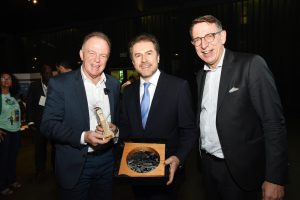
Luis Castiglioni, Former Vice President of Paraguay, with Governor Casagrande and Frank-Jürgen Richter
Several plenaries followed on the final meeting day. The first considered Fostering South American Unity chaired by Lucas Ferraz, Professor, Fundação Getulio Vargas. He was a former Federal Secretary of Foreign Trade, Ministry of Economy, Brazil. He mentioned the global situation of trade tariffs, saying the tariff rates within the Mercosur group and with the potential EU/Brazil link are contentious, but could be resolved within Mercosur/EU discussions. Luis Castiglioni, Former Vice President of Paraguay, Paraguay said Paraguay for over 30 years has decided to take the road of consolidation of public freedoms, along the road of democracy, and on the road of the absolute respect of human rights; and also to help the strengthening of these values anywhere in the world. Importantly Paraguay has declared a war without quarters, without asking for quarters, to international crime, to drug trafficking, to arms dealing, to contraband, to the laundering of assets and money. Roberto Fendt, Former Secretary for Trade and Foreign Affairs, Brazil demonstrated the close connection between Brazilian business interests and politics and its Latin American neighbors as well as the BRICS countries. A sentiment agreed by Federico Lavopa, Former Deputy Secretary for Trade, Argentina who is a coordinator of the Masters programme in International Relations and Negotiations at Flacso-Argentina at Higher University of San Andrés. Rodrigo Alejandro Yáñez Benítez, Secretary General, Sofofa; Former Vice Minister for Trade, Chile was unfazed by the varying trade volumes. As Vice Minister of Trade, he led Chile’s intense bilateral and multilateral trade agenda, including active participation in multilateral trade fora such as APEC, Pacific Alliance, and WTO: “I believe it strengthens my longstanding commitment to contribute to my country from the international perspective. Having met people with so many different backgrounds, all connected around a strong commitment to international understanding and cultural exchange, I see it has been of great inspiration.”
The plenary Creating Multiple Bridges Across Africa looked towards Africa’s future is which is bright, as session chair Shamsuddeen Usman noted. Armstrong Takang, Chief Executive Officer, Ministry of Finance Incorporated, Nigeria noted a distinct worry “For every barrel of oil we extract and spend, if we do not invest it in productive assets, we are depreciating our common wealth.” He lamented that revenues from the oil sector have not been adequately channeled into long-term projects, which has left the nation poorer despite its oil wealth. He brought a strong message about the need for reforming Nigeria’s state-owned enterprises, stating, “The success of these firms is essential to Nigeria’s economic future. Poor governance is preventing us from realizing our potential, but with the right reforms, we can change the narrative.” Nangula Nelulu Uaandja, Chief Executive Officer, Namibia Investment Promotion and Development Board, Namibia focused on the collaborative role required between the public and private sectors to drive inclusive economic growth and find common solutions to these challenges. She noted the burden of the triple challenges of unemployment, inequality and poverty that are facing Namibia. Sunday Adeojo, Co-Founder, Biodry2Energy, Nigeria is an entrepreneur with great passion for imparting knowledge on Africa’s youths “this is where the future lies”.
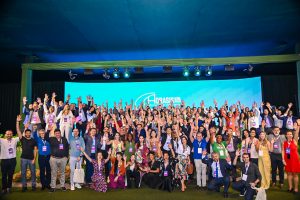
Celebrating the Horasis Global Meeting
The plenary B20’s Recommendations for the Horasis Global Meeting commented on the take-aways from the meeting. Dan Ioschpe, B20 Chair; Chairman, Iochpe Maxion, Brazil said that although the G20 brings together countries with great differences in economic, social inclusion and sustainability indicators, this diversity should, in fact, be seen as a huge opportunity. It favors a multiplicity of views that can facilitate the emergence of creative responses to common problems. Shariha Khanam Khalid, Founding Partner, Mission & Co., France underscored the primary goals of the B20′, themed as ‘Inclusive Growth for a Sustainable Future.’ She also elaborated on the systematic problems of bias against the female workforce. Women lack internet connectivity and digital literacy, partly due to women’s lack of education or cultural/social norms that lead to the exclusion of women from the digital world. Gender stereotypes replicated in technological systems pose a pernicious challenge in reinforcing these inequalities in work and care, as they articulate outdated visions in a high-tech vernacular. The panel was chaired by Priyam Gandhi-Mody, Author and Founder, Vishwamitra Research Foundation, India – as a thoughtful reminder she reposted “Irrespective of situation, firmness of personal and national character becomes the foundation of strength for the victory of auspiciousness and righteousness” originally presented by RSS Sarsanghchalak, Dr. Mohan ji Bhagwat.
Renato Casagrande, Governor, State of Espírito Santo, Brazil finally stated “The Horasis Global Meeting has positioned us as one of Brazil’s most competitive states. A modern state that wants to attract more and more investment. The meeting’s theme was about building bridges and we are very excited to look at this bridges that will lead the state to a sustainable future.” I would like to personally thank Governor Casagrande and all delegates for their efforts in building bridges to the future. The 2024 Horasis Global Meeting was a unique experience which would not have been possible without the dedication and enthusiasm of our partners from Espírito Santo, Brazil and the world.
The Horasis Global Meeting has illustrated how cooperation between the host nation, Brazil, is developing important links for the future. In times of globalization, leaders from business and government must redefine themselves by understanding the new rules where collaborative policies could ensure globally equitable governance. Sharing wealth can accelerate growth. In the face of growing isolationism, the world’s leaders must recommit to multilateral governance ensuring fair trade, safeguarding human rights and promoting fair social policies – they need to build bridges. In this spirit, Horasis looks forward to welcoming you again next year to an equally fruitful edition of the Horasis Global Meeting.
